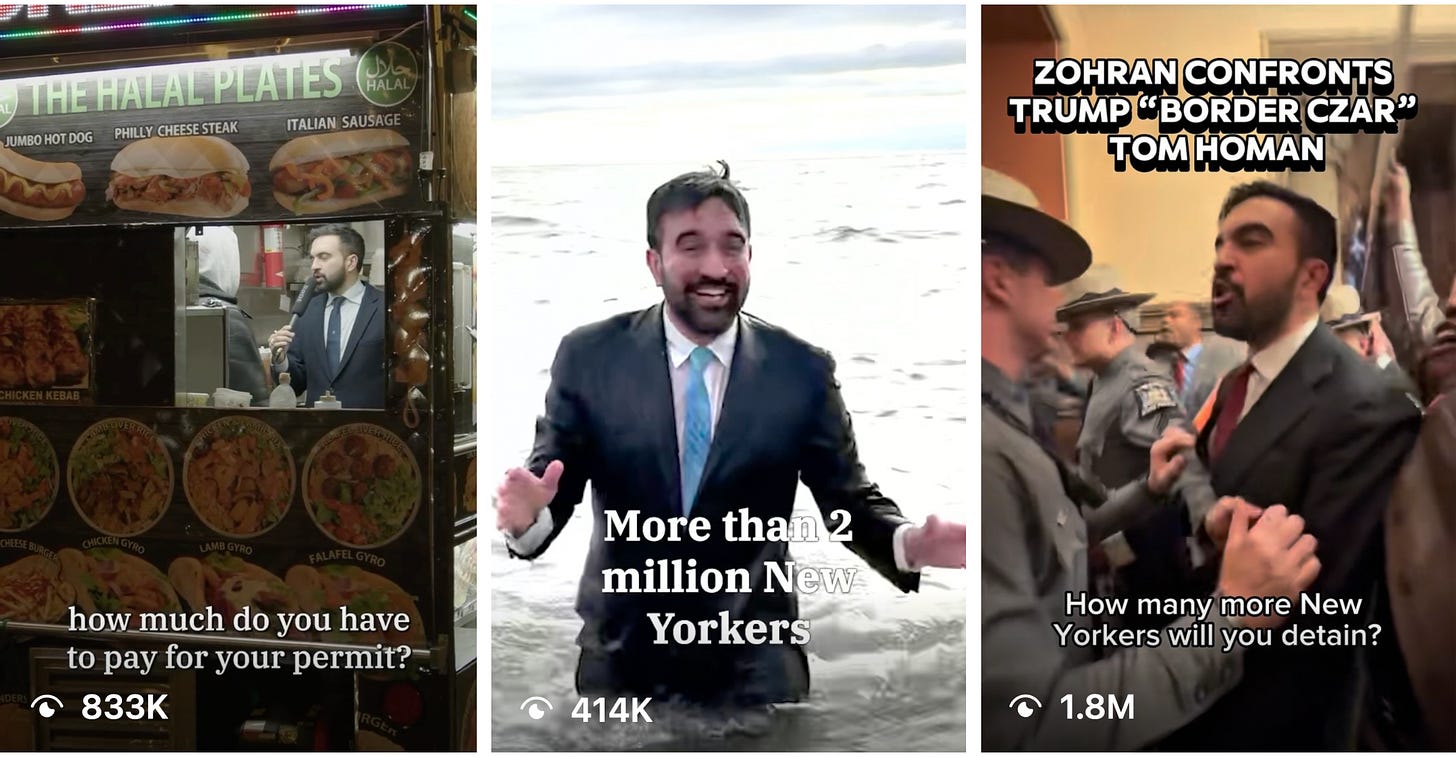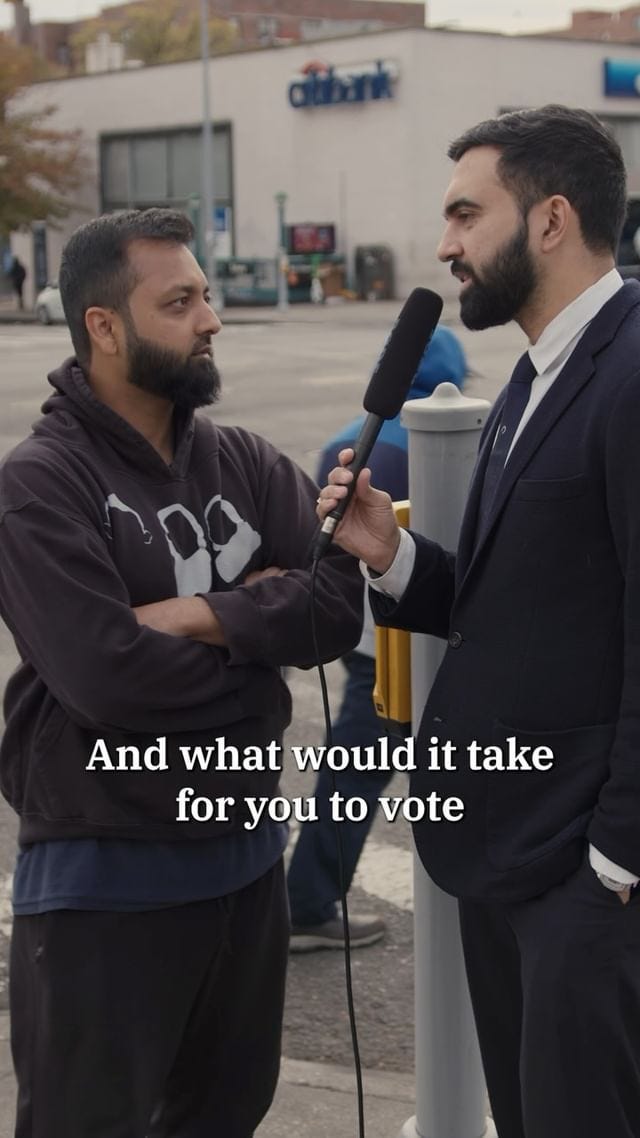The Agency Helping Progressive Candidates Break Through Online
Melted Solids has worked with Zohran Mamdani, Bernie Sanders, and more.
I’ve watched every single one of New York City mayoral candidate Zohran Mamdani’s social media videos despite living across the country in Los Angeles. The first post I ever came across was this video of Mamdani doing the Polar Bear Plunge to talk about rent freezes. It was clever, entertaining, and impactful. Soon I was getting served Mamdani’s videos on “Halalflation”, city-owned supermarkets, and even a Keep the Meter Running collab—all filmed in an engaging style that makes viewers want to stick around to the end. The posts often rack up hundreds of thousands of views. I needed to know who Mamdani was working with on them.
Melted Solids, an agency started by filmmaking duo Anthony DiMieri and Debbie Saslaw in 2019, is behind my favorite videos from Mamdani. DiMieri and Saslaw have found a way to leverage their experience in corporate advertising to support progressive candidates and organizations—working on everything from video development to post-production to social distribution. They’ve partnered with people like Bernie Sanders and Jamaal Bowman and organizations like the Freelancers Union and TREEage.
Prior to starting Melted Solids, DiMieri worked at Digitas, but took a long hiatus in his mid-20s to produce a near-zero-dollar viral sitcom. Parallel to this path was a political life, working for over a decade in the Bernie movements. Saslaw also worked in corporate advertising, spending time at Showtime and later HBO as one of their first digital content producers during the “pivot-to-video” era. Melted Solids essentially started with DiMieri and Saslaw calling up friends who had corporate jobs looking to do something political—that small collective became the incubator for their agency.
Below I talk to DiMieri and Saslaw about the importance of letting candidates riff, how they plan content (“I don’t think we’ve ever done a storyboard”), and what advice they’d give a marketer who wants to translate their skills to politics.
Rachel Karten: How would you describe the work that Melted Solids does?
Anthony DiMieri: It’s hard to find one simple way to describe it, but it seems safe to say we magnify the voices of progressive candidates and organizations. Those looking to take on the rich and powerful are generally the most removed from the consultant class and resources available to establishment candidates. We recognize that well-produced media is a weapon in any fight, and we’re happy to give folks the tools to amplify messages that would otherwise go ignored.
Debbie Saslaw: After working on Jamaal Bowman’s Congressional launch, we collaborated with Zohran on four videos for his Assembly campaign, and in 2021, we worked with six candidates running for city council. Aside from campaign work, we’ve worked on projects for unions and organizations like Jews for Racial and Economic Justice, Freelancers’ Union, TREEage, and are currently in pre-production on projects for a number of other advocacy groups. These are very much collaborations, both with comms teams and the candidates/orgs themselves, and we built longstanding relationships with so many brilliant and talented people along the way.
RK: There are a lot of conversations happening right now around how campaigns and politicians should approach social media. Can you talk a bit about your strategy when it comes to campaigns?
AD: We try to meet campaigns where they’re at and scale our productions according to their resources. When Bowman launched his campaign, his team wrote a script that was originally going to be read from cue cards. The delivery felt stilted, and there was a moment where we said, “Why don’t we just try improvising… tell us how you feel.” If you read the transcripts, his monologue reads like one of the most visionary political speeches in recent memory. So that’s what we’ve done, even when a candidate comes to us with a script – we give them moments to just riff, and the gold that comes from someone speaking from the heart is really unmatchable.
RK: Are you able to share more about your process when it comes to planning a video? What does the research and storyboarding look like?
DS: I don’t think we’ve ever done a storyboard. In our first dozen videos, we were lucky to collaborate with some incredible cinematographers who captured the charm and authenticity of neighborhoods in every borough (and even out of state.) Now, we’re moving towards a documentary-style process, which you can see in the video where we talk to Trump voters, small-dollar campaign donors, and everyday New Yorkers across all five boroughs. 90% of this footage ends up on the cutting room floor, but we’ve met some incredible people, and I wish we could make documentaries for so many of them.
RK: I'm curious about what role humor plays in political videos. I feel like what you do really well is hooking people with humor and entertainment, and then feeding them the message throughout the video. I mean, I've watched all of Zohran’s videos and I live in California.
DS: Anthony and Zohran are just incredibly funny people and have a distinct rapport that’s evolved since 2020.
AD: Debbie is actually hilarious as well, and I have proof (and more proof).
RK: There's a recent uptick in politicians utilizing trends and BRAT and memes to communicate to constituents. Do you think that's an effective strategy?
DS: We had a Dem-to-Trump voter in The Bronx say to us after the election, “Democrats want to shame you, they do these glitzy campaigns with celebrities…” It doesn’t work.
AD: There’s a tendency to Pokemon Go to the Polls and try to hop on a trend that may be immediately stale. People understand what’s authentic. In short, don’t hop on a meme.
RK: I know you focus more on the videos that candidates post themselves. But what role do you think social media plays outside of what a politician can sort of "own"? For example, those Jubilee clips are all over my feeds (for better or worse) or seeing other people post on social from the Fighting Oligarchy Tour. Do politicians need to be thinking about how to get seen on the social outside of their own presence?
DS: There’s a discrepancy between Twitter vs. everything else. Twitter is the journalists’ fishbowl, so that’s where content tends to pop off, but there are older demographics on Facebook that political comms teams tend to ignore, and not enough attention is paid to YouTube optimization. People tend to forget that YouTube is more than a search engine, and the algorithm can shape someone’s worldview very quickly. I’ve pointed candidates to the success of The Daily Wire, etc, and am not sure why Democratic strategists aren’t creating top-down content strategies based on these models.
RK: Can you share a piece of content you worked on that you're proud of or that you felt really delivered on its promise?
AD: Kareem Rahma and I have been close friends and close collaborators for the better part of a decade (fun fact: I’m technically Ep. 1 of @subwaytakes), so it was really special to have him and his show Keep The Meter Running as a platform for Zohran’s campaign.
DS: I loved the campaign we did with Zohran in 2022 in support of a legislative package to Fix the MTA. Our objective was to run a policy campaign like an electoral one, and it succeeded. I particularly loved a video on how a $3 fare hike would impact working-class New Yorkers, where we interviewed a spectacular woman in a senior center. She had been homeless for 10 years prior, and with money raised from our personal networks, we rented a U-Haul and furnished the entire place with pieces from a vintage warehouse. We all still keep in touch, too!
RK: Are there any politicians that you think are doing a really good job communicating via social media right now? Can you share a few?
AD: There are the usual Democrats that come up in these conversations: Bernie, AOC, etc. but we never neglect to acknowledge that Donald Trump is a true poster and his mastery of media will likely alter the course of human history for the next century.
DS: I can’t imagine Trump having a hierarchy of approvals, which is something we’ve encountered on campaigns of all sizes.
RK: There are a lot of important elections coming up. What advice would you give a politician wanting to break through on social media?
AD: Tim Walz came on Subway Takes and was brilliant. Meanwhile, Kamala skipping Joe Rogan after pressure from staffers was a big mistake. You should talk to everyone. Study the first Bernie campaign in 2015-16. Bernie talks to Republicans, to Christian fundamentalists - we should be able to talk to everyone, not just those in our socio-political-cultural ashrams.
DS: There’s a ceiling in terms of audience on social, so I still believe in traditional broadcast spots. One life goal is to build something as universally poignant Sanders’ America ad, and I’m absolutely sure I will do it.
RK: Finally, you both come from corporate advertising. A lot of people who read this newsletter work in corporate social. On a personal level, what has it been like taking those skills and applying them to helping progressive causes and candidates gain online traction? Is there any advice you'd give to someone who works in corporate social who might want to use their skills for similar causes?
AD + DS: When you study the economy deep enough, it’s so clear that in the United States, the vast majority of people are barely making ends meet and surviving on compounding debt. Those of us privileged enough to make a living in marketing are already operating in realms of comfort. We’ve worked in an air-conditioned office with catered food, making six-figure salaries, and know it's a luxury beyond what a great many people of this country have access to. Yet the conditions of comfort coexist among conditions of misery: we’ve personally felt what it is like to be on the brink of homelessness, accumulating medical debt, juggling multiple minimum wage jobs, and have witnessed the multi-generational pains of poverty within our wider families - it’s worth noting that the wounds of class are often invisible.
We feel that it’s the responsibility of those in positions of privilege and relative to advocate on behalf of those who may not have the time, network, education, or other resources that we do.
The same skills you have that help sell toothpaste, fast food, or kitchen appliances can easily be applied to a political life, and may be the difference of someone being able to afford healthcare or rent. A lot of corporate life means being assigned to work on projects that are often beyond one’s control or choice. But all of us can use our time and our talents to fight for something like a $30 minimum wage and potentially change the lives of millions of people in the process.









The last paragraphs, so powerful.
"Yet the conditions of comfort coexist among conditions of misery . . . it’s worth noting that the wounds of class are often invisible." Very impactful and so fitting within the larger context of effective political communication. Love!